Related Research Articles

The Great Ziegfeld is a 1936 American musical drama film directed by Robert Z. Leonard and produced by Hunt Stromberg. It stars William Powell as the theatrical impresario Florenz "Flo" Ziegfeld Jr., Luise Rainer as Anna Held, and Myrna Loy as Billie Burke.
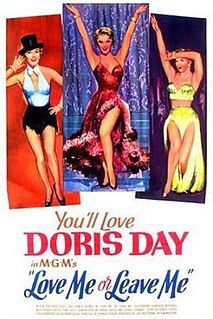
Love Me or Leave Me is a 1955 American biographical romantic musical drama film recounting the life story of Ruth Etting, a singer who rose from dancer to movie star. Nominated for six Academy Awards, the picture stars Doris Day as Etting, James Cagney as gangster Martin "Moe the Gimp" Snyder, her first husband and manager, and Cameron Mitchell as pianist/arranger Johnny Alderman, her second husband. Love Me or Leave Me was written by Daniel Fuchs and Isobel Lennart and directed by Charles Vidor.

Edgar Yipsel Harburg was an American popular song lyricist and librettist who worked with many well-known composers. He wrote the lyrics to the standards "Brother, Can You Spare a Dime?", "April in Paris", and "It's Only a Paper Moon", as well as all of the songs for the film The Wizard of Oz, including "Over the Rainbow". He was known for the social commentary of his lyrics, as well as his leftist leanings. He championed racial and gender equality and union politics. He also was an ardent critic of religion.

The Ziegfeld Follies was a series of elaborate theatrical revue productions on Broadway in New York City from 1907 to 1931, with renewals in 1934 and 1936. They became a radio program in 1932 and 1936 as The Ziegfeld Follies of the Air.
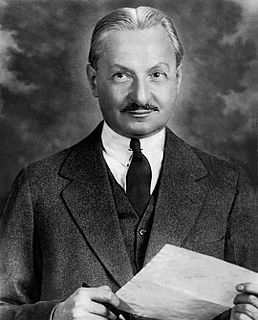
Florenz Edward Ziegfeld Jr. was an American Broadway impresario, notable for his series of theatrical revues, the Ziegfeld Follies (1907–1931), inspired by the Folies Bergère of Paris. He also produced the musical Show Boat. He was known as the "glorifier of the American girl". Ziegfeld is a member of the American Theater Hall of Fame.
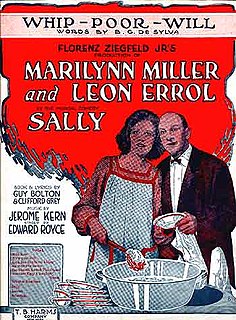
Sally is a musical comedy with music by Jerome Kern, lyrics by Clifford Grey and book by Guy Bolton, with additional lyrics by Buddy De Sylva, Anne Caldwell and P. G. Wodehouse. The plot hinges on a mistaken-identity: Sally, a waif, is a dishwasher at the Alley Inn. She poses as a famous foreign ballerina and rises to fame through joining the Ziegfeld Follies. There is a rags to riches story, a ballet as a centrepiece, and a wedding as a finale. "Look for the Silver Lining" continues to be one of Kern's most familiar songs. The song is lampooned by another song, "Look for a Sky of Blue," in Rick Besoyan's satirical 1959 musical Little Mary Sunshine.

"Shine On, Harvest Moon" is a popular early-1900s song credited to the married vaudeville team Nora Bayes and Jack Norworth. It was one of a series of moon-related Tin Pan Alley songs of the era. The song was debuted by Bayes and Norworth in the Ziegfeld Follies of 1908 to great acclaim. It became a pop standard, and continues to be performed and recorded in the 21st century.

Ziegfeld Follies is a 1945 American musical comedy film released by Metro-Goldwyn-Mayer, primarily directed by Vincente Minnelli, with segments directed by Lemuel Ayers, Roy Del Ruth, Robert Lewis, and George Sidney, the film's original director before Minnelli took over. Other directors that are claimed to have made uncredited contributions to the film are Merrill Pye, Norman Taurog, and Charles Walters. It stars many MGM leading talents, including Fred Astaire, Lucille Ball, Lucille Bremer, Fanny Brice, Judy Garland, Kathryn Grayson, Lena Horne, Gene Kelly, James Melton, Victor Moore, William Powell, Red Skelton, and Esther Williams.

Peter DeRose was an American composer of jazz and pop music during the era of Tin Pan Alley.

Doris Eaton Travis was an American dancer, stage and film actress, dance instructor, owner and manager, writer, and rancher, who was the last surviving Ziegfeld Girl, a troupe of acclaimed chorus girls who performed as members in the Broadway theatrical revues of the Ziegfeld Follies.
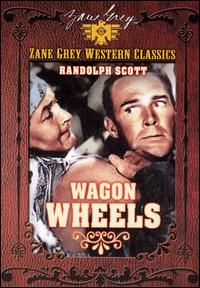
Wagon Wheels is a 1934 Western film directed by Charles Barton and starring Randolph Scott and Gail Patrick. It is a remake of 1931's Fighting Caravans, using stock footage from the original and substituting a new cast. It was based on the Zane Grey novel Fighting Caravans. The supporting cast features Monte Blue and Raymond Hatton.

Ziegfeld Girl is a 1941 American musical film directed by Robert Z. Leonard and starring James Stewart, Judy Garland, Hedy Lamarr, Lana Turner, Tony Martin, Jackie Cooper, Eve Arden, and Philip Dorn. The film, which features musical numbers by Busby Berkeley, was produced by Metro-Goldwyn-Mayer.
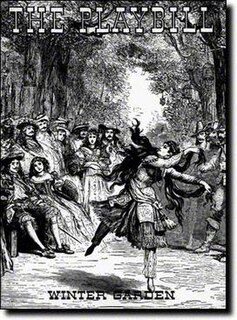
The Ziegfeld Follies of 1936 is a musical revue with lyrics by Ira Gershwin, music by Vernon Duke and sketches by Gershwin and David Freedman. The Ziegfeld Follies were a series of revues presented from 1907 through 1931, 1934, 1936, 1943, and 1957.
Raoul Pene Du Bois was an American costume designer and scenic designer for the stage and film. He was nominated for two Academy Awards in the category Best Art Direction.
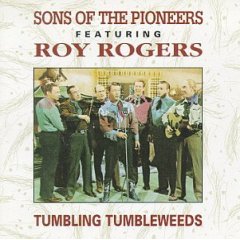
"Tumbling Tumbleweeds" is a song composed by Bob Nolan. Although one of the most famous songs associated with the Sons of the Pioneers, the song was composed by Nolan in the 1930s, while working as a caddy and living in Los Angeles. Originally titled "Tumbling Leaves," the song was reworked into the title "Tumbling Tumbleweeds" and into fame with the 1935 Gene Autry film of the same name. Members of the Western Writers of America chose it as one of the Top 100 Western songs of all time.
"The Cattle Call" is a song written and recorded in 1934 by American songwriter and musician Tex Owens. The melody was adapted from Bruno Rudzinksi's 1928 recording "Pawel Walc". It became a signature song for Eddy Arnold. Members of the Western Writers of America chose it as one of the Top 100 Western songs of all time.
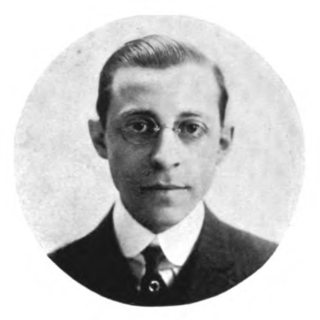
David Stamper was an American songwriter of the Tin Pan Alley and vaudeville eras, a contributor to twenty-one editions of the Ziegfeld Follies, writer for the Fox Film Corporation, and composer of more than one thousand songs, in spite of never learning to read or write traditional music notation. He may have written "Shine On Harvest Moon", a claim supported by vaudeville performer and writer Eddie Cantor. He was also a charter member of the American Society of Composers, Authors and Publishers or ASCAP.
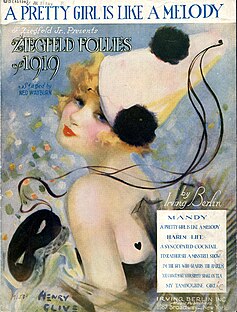
"A Pretty Girl Is Like A Melody" is a popular song written by Irving Berlin in 1919 which became the theme song of the Ziegfeld Follies. The first verse and refrain are considered part of the Great American Songbook and are often covered as a jazz standard.
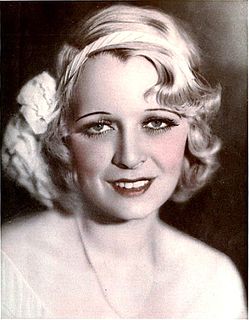
Noel Francis was an American actress of the stage and screen during the 1920s and 1930s. Born in Texas, she began her acting career on the Broadway stage in the mid-1920s, before moving to Hollywood at the beginning of the sound film era.

Everett Marshall was an American singer and actor who performed at the Metropolitan Opera, in Broadway revues, and in early musical films.
References
- ↑ Western Writers of America (2010). "The Top 100 Western Songs". American Cowboy. Archived from the original on 19 October 2010.
- ↑ "Wagon Wheels (1934) - Full Length Western Movie with Randolph Scott". YouTube. 2013-11-09. Retrieved 2015-02-08.
You will hear the song in the first few seconds of the film
- ↑ "Ziegfeld Follies of 1934 [Original Cast]". allmusic.com. AllMusic . Retrieved 2015-02-08.
- ↑ "Cover Versions of Wagon Wheels". secondhandsongs.com. Retrieved 2015-02-08.